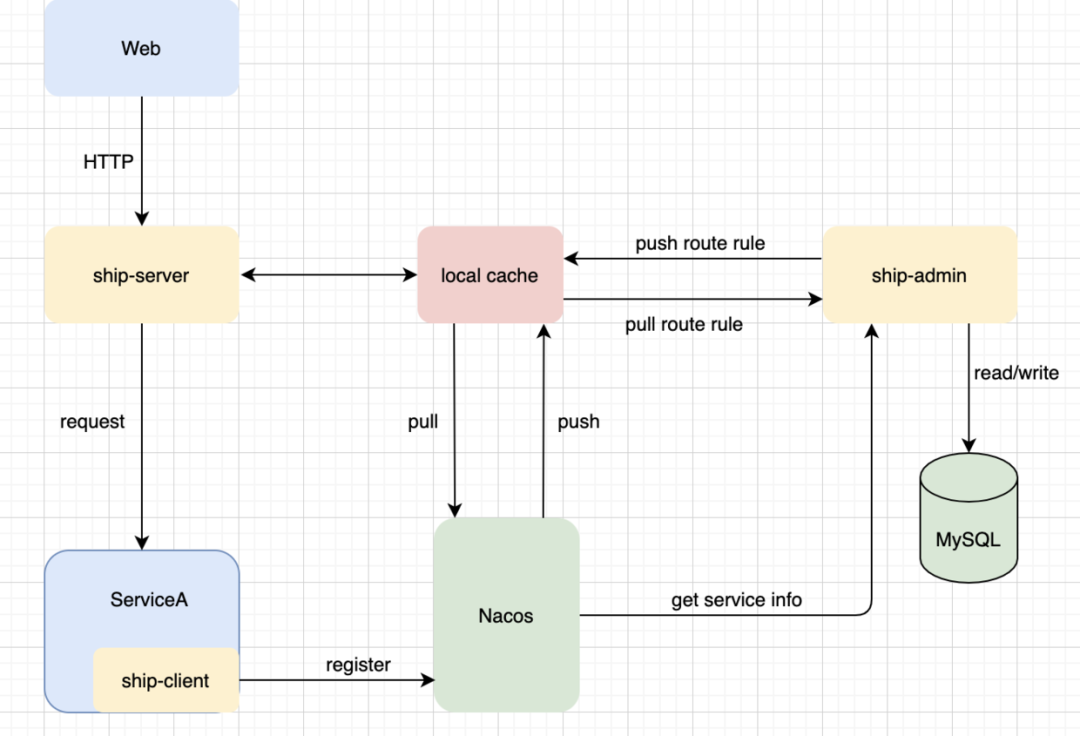如何设计一个高性能网关?

- 背景 -

- 设计 -
1、技术选型
Tomcat/Jetty+NIO+Servlet3
Netty+NIO
2、需求清单
3、架构设计


4、表结构设计


- 编码 -
* Created by 2YSP on 2020/12/21
*/
public class AutoRegisterListener implements ApplicationListener<ContextRefreshedEvent> {
private final static Logger LOGGER = LoggerFactory.getLogger(AutoRegisterListener.class);
private volatile AtomicBoolean registered = new AtomicBoolean(false);
private final ClientConfigProperties properties;
@NacosInjected
private NamingService namingService;
@Autowired
private RequestMappingHandlerMapping handlerMapping;
private final ExecutorService pool;
/**
* url list to ignore
*/
private static List<String> ignoreUrlList = new LinkedList<>();
static {
ignoreUrlList.add("/error");
}
public AutoRegisterListener(ClientConfigProperties properties) {
if (!check(properties)) {
LOGGER.error("client config port,contextPath,appName adminUrl and version can't be empty!");
throw new ShipException("client config port,contextPath,appName adminUrl and version can't be empty!");
}
this.properties = properties;
pool = new ThreadPoolExecutor(1, 4, 0, TimeUnit.SECONDS, new LinkedBlockingQueue<>());
}
/**
* check the ClientConfigProperties
*
* @param properties
* @return
*/
private boolean check(ClientConfigProperties properties) {
if (properties.getPort() == null| properties.getContextPath() == null
| properties.getVersion() == null| properties.getAppName() == null
| properties.getAdminUrl() == null) {
return false;
}
return true;
}
@Override
public void onApplicationEvent(ContextRefreshedEvent event) {
if (!registered.compareAndSet(false, true)) {
return;
}
doRegister();
registerShutDownHook();
}
/**
* send unregister request to admin when jvm shutdown
*/
private void registerShutDownHook() {
final String url = "http://" + properties.getAdminUrl() + AdminConstants.UNREGISTER_PATH;
final UnregisterAppDTO unregisterAppDTO = new UnregisterAppDTO();
unregisterAppDTO.setAppName(properties.getAppName());
unregisterAppDTO.setVersion(properties.getVersion());
unregisterAppDTO.setIp(IpUtil.getLocalIpAddress());
unregisterAppDTO.setPort(properties.getPort());
Runtime.getRuntime().addShutdownHook(new Thread(() -> {
OkhttpTool.doPost(url, unregisterAppDTO);
LOGGER.info("[{}:{}] unregister from ship-admin success!", unregisterAppDTO.getAppName(), unregisterAppDTO.getVersion());
}));
}
/**
* register all interface info to register center
*/
private void doRegister() {
Instance instance = new Instance();
instance.setIp(IpUtil.getLocalIpAddress());
instance.setPort(properties.getPort());
instance.setEphemeral(true);
Map<String, String> metadataMap = new HashMap<>();
metadataMap.put("version", properties.getVersion());
metadataMap.put("appName", properties.getAppName());
instance.setMetadata(metadataMap);
try {
namingService.registerInstance(properties.getAppName(), NacosConstants.APP_GROUP_NAME, instance);
} catch (NacosException e) {
LOGGER.error("register to nacos fail", e);
throw new ShipException(e.getErrCode(), e.getErrMsg());
}
LOGGER.info("register interface info to nacos success!");
// send register request to ship-admin
String url = "http://" + properties.getAdminUrl() + AdminConstants.REGISTER_PATH;
RegisterAppDTO registerAppDTO = buildRegisterAppDTO(instance);
OkhttpTool.doPost(url, registerAppDTO);
LOGGER.info("register to ship-admin success!");
}
private RegisterAppDTO buildRegisterAppDTO(Instance instance) {
RegisterAppDTO registerAppDTO = new RegisterAppDTO();
registerAppDTO.setAppName(properties.getAppName());
registerAppDTO.setContextPath(properties.getContextPath());
registerAppDTO.setIp(instance.getIp());
registerAppDTO.setPort(instance.getPort());
registerAppDTO.setVersion(properties.getVersion());
return registerAppDTO;
}
}
public class PluginFilter implements WebFilter {
private ServerConfigProperties properties;
public PluginFilter(ServerConfigProperties properties) {
this.properties = properties;
}
@Override
public Mono<Void> filter(ServerWebExchange exchange, WebFilterChain chain) {
String appName = parseAppName(exchange);
if (CollectionUtils.isEmpty(ServiceCache.getAllInstances(appName))) {
throw new ShipException(ShipExceptionEnum.SERVICE_NOT_FIND);
}
PluginChain pluginChain = new PluginChain(properties, appName);
pluginChain.addPlugin(new DynamicRoutePlugin(properties));
pluginChain.addPlugin(new AuthPlugin(properties));
return pluginChain.execute(exchange, pluginChain);
}
private String parseAppName(ServerWebExchange exchange) {
RequestPath path = exchange.getRequest().getPath();
String appName = path.value().split("/")[1];
return appName;
}
}```
PluginChain继承了AbstractShipPlugin并持有所有要执行的插件。
```java
* @Author: Ship
* @Description:
* @Date: Created in 2020/12/25
*/
public class PluginChain extends AbstractShipPlugin {
/**
* the pos point to current plugin
*/
private int pos;
/**
* the plugins of chain
*/
private List<ShipPlugin> plugins;
private final String appName;
public PluginChain(ServerConfigProperties properties, String appName) {
super(properties);
this.appName = appName;
}
/**
* add enabled plugin to chain
*
* @param shipPlugin
*/
public void addPlugin(ShipPlugin shipPlugin) {
if (plugins == null) {
plugins = new ArrayList<>();
}
if (!PluginCache.isEnabled(appName, shipPlugin.name())) {
return;
}
plugins.add(shipPlugin);
// order by the plugin's order
plugins.sort(Comparator.comparing(ShipPlugin::order));
}
@Override
public Integer order() {
return null;
}
@Override
public String name() {
return null;
}
@Override
public Mono<Void> execute(ServerWebExchange exchange, PluginChain pluginChain) {
if (pos == plugins.size()) {
return exchange.getResponse().setComplete();
}
return pluginChain.plugins.get(pos++).execute(exchange, pluginChain);
}
public String getAppName() {
return appName;
}
}
AbstractShipPlugin实现了ShipPlugin接口,并持有ServerConfigProperties配置对象。
public abstract class AbstractShipPlugin implements ShipPlugin {
protected ServerConfigProperties properties;
public AbstractShipPlugin(ServerConfigProperties properties) {
this.properties = properties;
}
}```
ShipPlugin接口定义了所有插件必须实现的三个方法order(),name()和execute()。
```java
public interface ShipPlugin {
/**
* lower values have higher priority
*
* @return
*/
Integer order();
/**
* return current plugin name
*
* @return
*/
String name();
Mono<Void> execute(ServerWebExchange exchange,PluginChain pluginChain);
}```
DynamicRoutePlugin继承了抽象类AbstractShipPlugin,包含了动态路由的主要业务逻辑。
```java
* @Author: Ship
* @Description:
* @Date: Created in 2020/12/25
*/
public class DynamicRoutePlugin extends AbstractShipPlugin {
private final static Logger LOGGER = LoggerFactory.getLogger(DynamicRoutePlugin.class);
private static WebClient webClient;
private static final Gson gson = new GsonBuilder().create();
static {
HttpClient httpClient = HttpClient.create()
.tcpConfiguration(client ->
client.doOnConnected(conn ->
conn.addHandlerLast(new ReadTimeoutHandler(3))
.addHandlerLast(new WriteTimeoutHandler(3)))
.option(ChannelOption.TCP_NODELAY, true)
);
webClient = WebClient.builder().clientConnector(new ReactorClientHttpConnector(httpClient))
.build();
}
public DynamicRoutePlugin(ServerConfigProperties properties) {
super(properties);
}
@Override
public Integer order() {
return ShipPluginEnum.DYNAMIC_ROUTE.getOrder();
}
@Override
public String name() {
return ShipPluginEnum.DYNAMIC_ROUTE.getName();
}
@Override
public Mono<Void> execute(ServerWebExchange exchange, PluginChain pluginChain) {
String appName = pluginChain.getAppName();
ServiceInstance serviceInstance = chooseInstance(appName, exchange.getRequest());
// LOGGER.info("selected instance is [{}]", gson.toJson(serviceInstance));
// request service
String url = buildUrl(exchange, serviceInstance);
return forward(exchange, url);
}
/**
* forward request to backend service
*
* @param exchange
* @param url
* @return
*/
private Mono<Void> forward(ServerWebExchange exchange, String url) {
ServerHttpRequest request = exchange.getRequest();
ServerHttpResponse response = exchange.getResponse();
HttpMethod method = request.getMethod();
WebClient.RequestBodySpec requestBodySpec = webClient.method(method).uri(url).headers((headers) -> {
headers.addAll(request.getHeaders());
});
WebClient.RequestHeadersSpec<?> reqHeadersSpec;
if (requireHttpBody(method)) {
reqHeadersSpec = requestBodySpec.body(BodyInserters.fromDataBuffers(request.getBody()));
} else {
reqHeadersSpec = requestBodySpec;
}
// nio->callback->nio
return reqHeadersSpec.exchange().timeout(Duration.ofMillis(properties.getTimeOutMillis()))
.onErrorResume(ex -> {
return Mono.defer(() -> {
String errorResultJson = "";
if (ex instanceof TimeoutException) {
errorResultJson = "{\"code\":5001,\"message\":\"network timeout\"}";
} else {
errorResultJson = "{\"code\":5000,\"message\":\"system error\"}";
}
return ShipResponseUtil.doResponse(exchange, errorResultJson);
}).then(Mono.empty());
}).flatMap(backendResponse -> {
response.setStatusCode(backendResponse.statusCode());
response.getHeaders().putAll(backendResponse.headers().asHttpHeaders());
return response.writeWith(backendResponse.bodyToFlux(DataBuffer.class));
});
}
/**
* weather the http method need http body
*
* @param method
* @return
*/
private boolean requireHttpBody(HttpMethod method) {
if (method.equals(HttpMethod.POST)| method.equals(HttpMethod.PUT)| method.equals(HttpMethod.PATCH)) {
return true;
}
return false;
}
private String buildUrl(ServerWebExchange exchange, ServiceInstance serviceInstance) {
ServerHttpRequest request = exchange.getRequest();
String query = request.getURI().getQuery();
String path = request.getPath().value().replaceFirst("/" + serviceInstance.getAppName(), "");
String url = "http://" + serviceInstance.getIp() + ":" + serviceInstance.getPort() + path;
if (!StringUtils.isEmpty(query)) {
url = url + "?" + query;
}
return url;
}
/**
* choose an ServiceInstance according to route rule config and load balancing algorithm
*
* @param appName
* @param request
* @return
*/
private ServiceInstance chooseInstance(String appName, ServerHttpRequest request) {
List<ServiceInstance> serviceInstances = ServiceCache.getAllInstances(appName);
if (CollectionUtils.isEmpty(serviceInstances)) {
LOGGER.error("service instance of {} not find", appName);
throw new ShipException(ShipExceptionEnum.SERVICE_NOT_FIND);
}
String version = matchAppVersion(appName, request);
if (StringUtils.isEmpty(version)) {
throw new ShipException("match app version error");
}
// filter serviceInstances by version
List<ServiceInstance> instances = serviceInstances.stream().filter(i -> i.getVersion().equals(version)).collect(Collectors.toList());
//Select an instance based on the load balancing algorithm
LoadBalance loadBalance = LoadBalanceFactory.getInstance(properties.getLoadBalance(), appName, version);
ServiceInstance serviceInstance = loadBalance.chooseOne(instances);
return serviceInstance;
}
private String matchAppVersion(String appName, ServerHttpRequest request) {
List<AppRuleDTO> rules = RouteRuleCache.getRules(appName);
rules.sort(Comparator.comparing(AppRuleDTO::getPriority).reversed());
for (AppRuleDTO rule : rules) {
if (match(rule, request)) {
return rule.getVersion();
}
}
return null;
}
private boolean match(AppRuleDTO rule, ServerHttpRequest request) {
String matchObject = rule.getMatchObject();
String matchKey = rule.getMatchKey();
String matchRule = rule.getMatchRule();
Byte matchMethod = rule.getMatchMethod();
if (MatchObjectEnum.DEFAULT.getCode().equals(matchObject)) {
return true;
} else if (MatchObjectEnum.QUERY.getCode().equals(matchObject)) {
String param = request.getQueryParams().getFirst(matchKey);
if (!StringUtils.isEmpty(param)) {
return StringTools.match(param, matchMethod, matchRule);
}
} else if (MatchObjectEnum.HEADER.getCode().equals(matchObject)) {
HttpHeaders headers = request.getHeaders();
String headerValue = headers.getFirst(matchKey);
if (!StringUtils.isEmpty(headerValue)) {
return StringTools.match(headerValue, matchMethod, matchRule);
}
}
return false;
}
}
3、数据同步
* @Author: Ship
* @Description:
* @Date: Created in 2020/12/30
*/
@Configuration
public class NacosSyncListener implements ApplicationListener<ContextRefreshedEvent> {
private static final Logger LOGGER = LoggerFactory.getLogger(NacosSyncListener.class);
private static ScheduledThreadPoolExecutor scheduledPool = new ScheduledThreadPoolExecutor(1,
new ShipThreadFactory("nacos-sync", true).create());
@NacosInjected
private NamingService namingService;
@Value("${nacos.discovery.server-addr}")
private String baseUrl;
@Resource
private AppService appService;
@Override
public void onApplicationEvent(ContextRefreshedEvent event) {
if (event.getApplicationContext().getParent() != null) {
return;
}
String url = "http://" + baseUrl + NacosConstants.INSTANCE_UPDATE_PATH;
scheduledPool.scheduleWithFixedDelay(new NacosSyncTask(namingService, url, appService), 0, 30L, TimeUnit.SECONDS);
}
class NacosSyncTask implements Runnable {
private NamingService namingService;
private String url;
private AppService appService;
private Gson gson = new GsonBuilder().create();
public NacosSyncTask(NamingService namingService, String url, AppService appService) {
this.namingService = namingService;
this.url = url;
this.appService = appService;
}
/**
* Regular update weight,enabled plugins to nacos instance
*/
@Override
public void run() {
try {
// get all app names
ListView<String> services = namingService.getServicesOfServer(1, Integer.MAX_VALUE, NacosConstants.APP_GROUP_NAME);
if (CollectionUtils.isEmpty(services.getData())) {
return;
}
List<String> appNames = services.getData();
List<AppInfoDTO> appInfos = appService.getAppInfos(appNames);
for (AppInfoDTO appInfo : appInfos) {
if (CollectionUtils.isEmpty(appInfo.getInstances())) {
continue;
}
for (ServiceInstance instance : appInfo.getInstances()) {
Map<String, Object> queryMap = buildQueryMap(appInfo, instance);
String resp = OkhttpTool.doPut(url, queryMap, "");
LOGGER.debug("response :{}", resp);
}
}
} catch (Exception e) {
LOGGER.error("nacos sync task error", e);
}
}
private Map<String, Object> buildQueryMap(AppInfoDTO appInfo, ServiceInstance instance) {
Map<String, Object> map = new HashMap<>();
map.put("serviceName", appInfo.getAppName());
map.put("groupName", NacosConstants.APP_GROUP_NAME);
map.put("ip", instance.getIp());
map.put("port", instance.getPort());
map.put("weight", instance.getWeight().doubleValue());
NacosMetadata metadata = new NacosMetadata();
metadata.setAppName(appInfo.getAppName());
metadata.setVersion(instance.getVersion());
metadata.setPlugins(String.join(",", appInfo.getEnabledPlugins()));
map.put("metadata", StringTools.urlEncode(gson.toJson(metadata)));
map.put("ephemeral", true);
return map;
}
}
}
ship-server再定时从Nacos拉取app数据更新到本地Map缓存。
* @Author: Ship
* @Description: sync data to local cache
* @Date: Created in 2020/12/25
*/
@Configuration
public class DataSyncTaskListener implements ApplicationListener<ContextRefreshedEvent> {
private static ScheduledThreadPoolExecutor scheduledPool = new ScheduledThreadPoolExecutor(1,
new ShipThreadFactory("service-sync", true).create());
@NacosInjected
private NamingService namingService;
@Autowired
private ServerConfigProperties properties;
@Override
public void onApplicationEvent(ContextRefreshedEvent event) {
if (event.getApplicationContext().getParent() != null) {
return;
}
scheduledPool.scheduleWithFixedDelay(new DataSyncTask(namingService)
, 0L, properties.getCacheRefreshInterval(), TimeUnit.SECONDS);
WebsocketSyncCacheServer websocketSyncCacheServer = new WebsocketSyncCacheServer(properties.getWebSocketPort());
websocketSyncCacheServer.start();
}
class DataSyncTask implements Runnable {
private NamingService namingService;
public DataSyncTask(NamingService namingService) {
this.namingService = namingService;
}
@Override
public void run() {
try {
// get all app names
ListView<String> services = namingService.getServicesOfServer(1, Integer.MAX_VALUE, NacosConstants.APP_GROUP_NAME);
if (CollectionUtils.isEmpty(services.getData())) {
return;
}
List<String> appNames = services.getData();
// get all instances
for (String appName : appNames) {
List<Instance> instanceList = namingService.getAllInstances(appName, NacosConstants.APP_GROUP_NAME);
if (CollectionUtils.isEmpty(instanceList)) {
continue;
}
ServiceCache.add(appName, buildServiceInstances(instanceList));
List<String> pluginNames = getEnabledPlugins(instanceList);
PluginCache.add(appName, pluginNames);
}
ServiceCache.removeExpired(appNames);
PluginCache.removeExpired(appNames);
} catch (NacosException e) {
e.printStackTrace();
}
}
private List<String> getEnabledPlugins(List<Instance> instanceList) {
Instance instance = instanceList.get(0);
Map<String, String> metadata = instance.getMetadata();
// plugins: DynamicRoute,Auth
String plugins = metadata.getOrDefault("plugins", ShipPluginEnum.DYNAMIC_ROUTE.getName());
return Arrays.stream(plugins.split(",")).collect(Collectors.toList());
}
private List<ServiceInstance> buildServiceInstances(List<Instance> instanceList) {
List<ServiceInstance> list = new LinkedList<>();
instanceList.forEach(instance -> {
Map<String, String> metadata = instance.getMetadata();
ServiceInstance serviceInstance = new ServiceInstance();
serviceInstance.setAppName(metadata.get("appName"));
serviceInstance.setIp(instance.getIp());
serviceInstance.setPort(instance.getPort());
serviceInstance.setVersion(metadata.get("version"));
serviceInstance.setWeight((int) instance.getWeight());
list.add(serviceInstance);
});
return list;
}
}
}
路由规则数据同步
* @Author: Ship
* @Description:
* @Date: Created in 2020/12/28
*/
public class WebsocketSyncCacheServer extends WebSocketServer {
private final static Logger LOGGER = LoggerFactory.getLogger(WebsocketSyncCacheServer.class);
private Gson gson = new GsonBuilder().create();
private MessageHandler messageHandler;
public WebsocketSyncCacheServer(Integer port) {
super(new InetSocketAddress(port));
this.messageHandler = new MessageHandler();
}
@Override
public void onOpen(WebSocket webSocket, ClientHandshake clientHandshake) {
LOGGER.info("server is open");
}
@Override
public void onClose(WebSocket webSocket, int i, String s, boolean b) {
LOGGER.info("websocket server close...");
}
@Override
public void onMessage(WebSocket webSocket, String message) {
LOGGER.info("websocket server receive message:\n[{}]", message);
this.messageHandler.handler(message);
}
@Override
public void onError(WebSocket webSocket, Exception e) {
}
@Override
public void onStart() {
LOGGER.info("websocket server start...");
}
class MessageHandler {
public void handler(String message) {
RouteRuleOperationDTO operationDTO = gson.fromJson(message, RouteRuleOperationDTO.class);
if (CollectionUtils.isEmpty(operationDTO.getRuleList())) {
return;
}
Map<String, List<AppRuleDTO>> map = operationDTO.getRuleList()
.stream().collect(Collectors.groupingBy(AppRuleDTO::getAppName));
if (OperationTypeEnum.INSERT.getCode().equals(operationDTO.getOperationType())
| OperationTypeEnum.UPDATE.getCode().equals(operationDTO.getOperationType())) {
RouteRuleCache.add(map);
} else if (OperationTypeEnum.DELETE.getCode().equals(operationDTO.getOperationType())) {
RouteRuleCache.remove(map);
}
}
}
}
客户端WebsocketSyncCacheClient:
* @Author: Ship
* @Description:
* @Date: Created in 2020/12/28
*/
@Component
public class WebsocketSyncCacheClient {
private final static Logger LOGGER = LoggerFactory.getLogger(WebsocketSyncCacheClient.class);
private WebSocketClient client;
private RuleService ruleService;
private Gson gson = new GsonBuilder().create();
public WebsocketSyncCacheClient(@Value("${ship.server-web-socket-url}") String serverWebSocketUrl,
RuleService ruleService) {
if (StringUtils.isEmpty(serverWebSocketUrl)) {
throw new ShipException(ShipExceptionEnum.CONFIG_ERROR);
}
this.ruleService = ruleService;
ScheduledThreadPoolExecutor executor = new ScheduledThreadPoolExecutor(1,
new ShipThreadFactory("websocket-connect", true).create());
try {
client = new WebSocketClient(new URI(serverWebSocketUrl)) {
@Override
public void onOpen(ServerHandshake serverHandshake) {
LOGGER.info("client is open");
List<AppRuleDTO> list = ruleService.getEnabledRule();
String msg = gson.toJson(new RouteRuleOperationDTO(OperationTypeEnum.INSERT, list));
send(msg);
}
@Override
public void onMessage(String s) {
}
@Override
public void onClose(int i, String s, boolean b) {
}
@Override
public void onError(Exception e) {
LOGGER.error("websocket client error", e);
}
};
client.connectBlocking();
//使用调度线程池进行断线重连,30秒进行一次
executor.scheduleAtFixedRate(() -> {
if (client != null && client.isClosed()) {
try {
client.reconnectBlocking();
} catch (InterruptedException e) {
LOGGER.error("reconnect server fail", e);
}
}
}, 10, 30, TimeUnit.SECONDS);
} catch (Exception e) {
LOGGER.error("websocket sync cache exception", e);
throw new ShipException(e.getMessage());
}
}
public <T> void send(T t) {
while (!client.getReadyState().equals(ReadyState.OPEN)) {
LOGGER.debug("connecting ...please wait");
}
client.send(gson.toJson(t));
}
}
- 测试 -
1、动态路由测试
本地启动nacos ,sh startup.sh -m standalone;
启动ship-admin;
本地启动两个ship-example实例。
ship:
http:
app-name: order
version: gray_1.0
context-path: /order
port: 8081
admin-url: 127.0.0.1:9001
server:
port: 8081
nacos:
discovery:
server-addr: 127.0.0.1:8848
实例2配置:
ship:
http:
app-name: order
version: prod_1.0
context-path: /order
port: 8082
admin-url: 127.0.0.1:9001
server:
port: 8082
nacos:
discovery:
server-addr: 127.0.0.1:8848

2021-01-02 19:57:09.159 INFO 30413 --- [SocketWorker-29] cn.sp.sync.WebsocketSyncCacheServer : websocket server receive message:
[{"operationType":"INSERT","ruleList":[{"id":1,"appId":5,"appName":"order","version":"gray_1.0","matchObject":"HEADER","matchKey":"name","matchMethod":1,"matchRule":"ship","priority":50}]}]
用Postman请求http://localhost:9000/order/user/add,POST方式,header设置name=ship,可以看到只有实例1有日志显示。
==========add user,version:gray_1.0
2、性能压测
MacBook Pro 13英寸 处理器 2.3 GHz 四核Intel Core i7 内存 16 GB 3733 MHz LPDDR4X 后端节点个数一个 压测工具:wrk 压测结果:20个线程,500个连接数,吞吐量大概每秒9400个请求。


- 总结 -
内容来源于网络,版权归原作者所有。
评论
